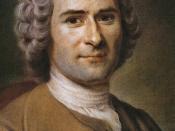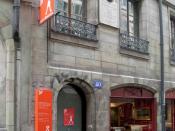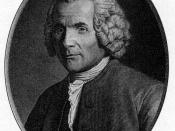All men are born equal, but even before taking his first step or uttering his first word, a baby understands that it is every man for himself. Human nature may be born good--pure, simple, and as innocent as the baby himself--but when left to survive in this world, societal influences will ultimately shape and twist it into something else entirely. Rousseau understood this progression of human nature, and society's corruption of it. As he observed, "man is born free, yet everywhere he is in chains." A government recognizes man's natural rights--the right of life and liberty--but society infringes upon them. This essay will examine societal mainstreams and practices, such as the effects of private property and peer pressure, which have pitted individuals against each other and crumbled the government. Both man and government are victims of societal pressures, but they are also their own saviors. In redemption and resurrection, Rousseau argues, man must take his own freedoms in hand and have a leader to ensure that these freedoms will stay protected from society.
Otherwise, society will gain control and chaos will reign. Should that happen, a leader would have to force his compatriots to take advantage of their rights and freedoms, and push society back down.
The right to food and shelter allows man a chance of survival. However, as society progressed, the right to have a home became more complex. Men now wanted a right to enjoy private property, which Rousseau believed was the evil of all evils. Out of this new right, greed and the desire to further one's own interests triggered political conflicts that infringed upon men's rights to life and liberty. Every war in history has sprung forth from this "dog eat dog" principle. The US, the biggest dog of all, starts wars to attain a...


